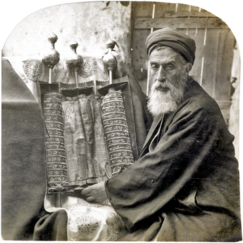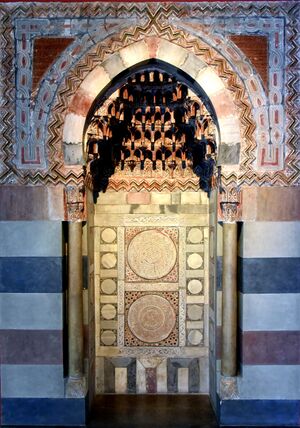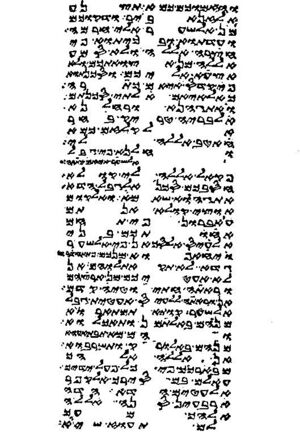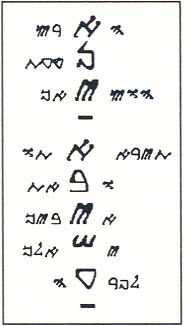التوراة السامرية

| جزء من سلسلة عن |
| الكتاب المقدس |
|---|
|
Outline of Bible-related topics |
التوراة السامرية (Samaritan Hebrew: ࠕࠅࠓࠡࠄ ࠔࠌࠓࠉࠌ, Tōrāʾ Shamaeriym; بالعبرية: תוֹרה שַמֶרִים, Torah Shomronit), also called the Samaritan Pentateuch هي مصطلح يطلق علي النص التوراتي الذي يؤمن به السامريون ، وهو النص المعتمد لديهم.[1] وهذا المصطلح يقابل مصطلح التوراة العبرانية التي يؤمن بها ويعتمدها اليهود .
It dates back to one of the ancient versions of the Hebrew Bible that existed during the Second Temple period, and constitutes the entire biblical canon in Samaritanism.[1]
Some six thousand differences exist between the Samaritan and the Jewish Masoretic Text. Most are minor variations in the spelling of words or grammatical constructions, but others involve significant semantic changes, such as the uniquely Samaritan commandment to construct an altar on Mount Gerizim. Nearly two thousand of these textual variations agree with the Koine Greek Septuagint and some are shared with the Latin Vulgate. Throughout their history, Samaritans have made use of translations of the Samaritan Pentateuch into Aramaic, Greek, and Arabic, as well as liturgical and exegetical works based upon it.
It first became known to the Western world in 1631, proving the first example of the Samaritan alphabet and sparking an intense theological debate regarding its relative age versus the Masoretic Text.[2] This first published copy, much later labelled as Codex B by August von Gall, became the source of most Western critical editions of the Samaritan Pentateuch until the latter half of the 20th century; today the codex is held in the Bibliothèque nationale de France.[3]
Some Pentateuchal manuscripts discovered among the Dead Sea Scrolls have been identified as bearing a "pre-Samaritan" text type.[4][5]
. . . . . . . . . . . . . . . . . . . . . . . . . . . . . . . . . . . . . . . . . . . . . . . . . . . . . . . . . . . . . . . . . . . . . . . . . . . . . . . . . . . . . . . . . . . . . . . . . . . . . . . . . . . . . . . . . . . . . . . . . . . . . . . . . . . . . . . . . . . . . . . . . . . . . . . . . . . . . . . . . . . . . . . .
الأصل والأهمية الشرائعية
التقاليد السامرية


Samaritans believe that God authored their Pentateuch and gave Moses the first copy along with the two tablets containing the Ten Commandments.[6] They believe that they preserve this divinely composed text uncorrupted to the present day. Samaritans commonly refer to their Pentateuch as قالب:Script/Samaritan (Qushta, Aramaic for "Truth").[6]
Samaritans include only the Pentateuch in their biblical canon.[7] They do not recognize divine authorship or inspiration in any other book in the Jewish Tanakh.[8] A Samaritan Book of Joshua partly based upon the Tanakh's Book of Joshua exists, but Samaritans regard it as a non-canonical secular historical chronicle.[9]
According to a view based on the biblical Book of Ezra (Ezra 4:11), the Samaritans are the people of Samaria who parted ways with the people of Judah (the Judahites) in the Persian period.[10] The Samaritans believe that it was not they, but the Jews, who separated from the authentic stream of the Israelite tradition and law, around the time of Eli, in the 11th century BCE. Jews have traditionally connected the origin of the Samaritans with the later events described in 2 Kings 17:24–41 claiming that the Samaritans are not related to the Israelites, but to those brought to Samaria by the Assyrians.[10]
المخطوطات والنسخ المطبوعة
المخطوطات
لفافة أبيشا
وصول التوراة السامرية للغرب
جهل الغرب عن هذه التوراة حتى القرن السادس عشر عندما اشترى أحد المسافرين مخطوطة من دمشق. وعند السامريين (كتعريب لكلمة شومريم) فالكتاب المقدس هو الأسفار الخمسة الأولى فقط، أما مالم ينسب لموسى فلا يؤمنون به. وتختلف التوراة السامرية عن اليهودية في آلاف المواضع، وفي بعض تلك المواضع تتفق نسختهم مع النسخة اليونانية السبعينية ضد النسخة اليهودية الماسورتية التي أخذت شكلها النهائي في القرن العاشر للميلاد.
وقد ترجمها أحد علمائهم للعربية، ويلاحظ تجنبها لعبارات غير لائقة عبر إضافة كلمة (ملاك) أمام كلمة (الله) أحيانا.
والتوراة مكتوبة بأحرف أقدم من تلك الموجودة في النسخة اليهودية.
وقد لاحظ ابن القيم (في كتابه هداية الحيارى) أن الوصايا العشر عندهم مختلفة عن تلك عند اليهود، وذلك لاختلاف نسختهم عن النسخة اليهودية، في كتابه هداية الحيارى.
وقد لاحظ دارسو مخطوطات البحر الميت وجود بعض المخطوطات المشابهة لنسخ السامريين.
انظر أيضاً
الهامش
- ^ أ ب Florentin, Moshe (2013). "Samaritan Pentateuch". In Khan, Geoffrey; Bolozky, Shmuel; Fassberg, Steven; Rendsburg, Gary A.; Rubin, Aaron D.; Schwarzwald, Ora R.; Zewi, Tamar (eds.). Encyclopedia of Hebrew Language and Linguistics. Leiden and Boston: Brill Publishers. doi:10.1163/2212-4241_ehll_EHLL_COM_00000282. ISBN 978-90-04-17642-3.
- ^ خطأ استشهاد: وسم
<ref>غير صحيح؛ لا نص تم توفيره للمراجع المسماةFlorentin - ^ Anderson & Giles 2012, p. 150.
- ^ The Canon Debate, McDonald & Sanders editors, 2002, chapter 6: Questions of Canon through the Dead Sea Scrolls by James C. VanderKam, page 94, citing private communication with Emanuel Tov on biblical manuscripts: Qumran scribe type c. 25%, proto-Masoretic Text c. 40%, pre-Samaritan texts c. 5%, texts close to the Hebrew model for the Septuagint c. 5% and nonaligned c. 25%.
- ^ Tov, Emanuel (2015). "The Samaritan Pentateuch and the Dead Sea Scrolls: The Proximity of the Pre-Samaritan Qumran Scrolls to the SP". In Tov, Emanuel (ed.). Textual Criticism of the Hebrew Bible, Qumran, Septuagint: Collected Essays, Volume 3. Vetus Testamentum, Supplements. Vol. 167. Leiden: Brill Publishers. pp. 387–410. ISBN 978-90-04-27013-8.
- ^ أ ب Gaster, T.H. "Samaritans," pp. 190–197 in Interpreter's Dictionary of the Bible, Volume 4. George Arthur Buttrick, gen. ed. Nashville: Abingdon, 1962.
- ^ Vanderkam 2002, p. 91.
- ^ Although a paucity of extant source material makes it impossible to be certain that the earliest Samaritans also rejected the other books of the Tanakh, the third-century church father Origen confirms that the Samaritans in his day "receive[d] the books of Moses alone." (Commentary on John 13:26)
- ^ Gaster, M. (1908). "A Samaritan Book of Joshua". The Living Age. 258: 166.
- ^ أ ب Tov 2001, pp. 82–83.
مراجع
- كتاب التوراة السامرية: ترجمة إسحاق الصوري وتحقيق أحمد حجازي السقا.
- من الموسوعة البريطانية
- دليل عن المخطوطات السامرية
- مثال على اختلاف السامرية عن العبرانية
وصلات خارجية
- Jewish Encyclopedia: Samaritans: Samaritan Version of the Pentateuch
- Samaritan Pentateuch Add.1846 – digitised version of the earliest complete manuscript of the Samaritan Pentateuch on Cambridge Digital Library
- Articles with hatnote templates targeting a nonexistent page
- Short description matches Wikidata
- Articles containing عبرية-language text
- 2nd-century BC books
- Torah
- Biblical criticism
- Early versions of the Bible
- Ancient Jewish literature
- Jewish prayer and ritual texts
- Samaritan texts
- Texts attributed to Moses
- Ancient Hebrew texts
- يهودية



